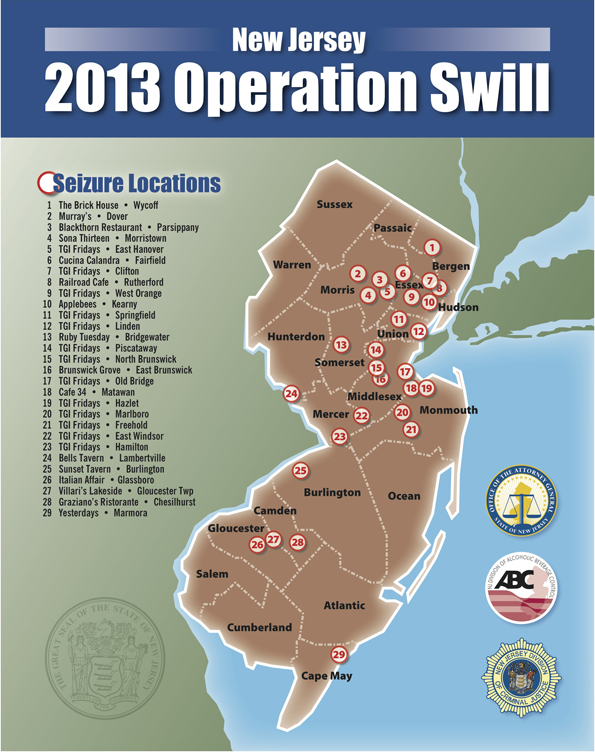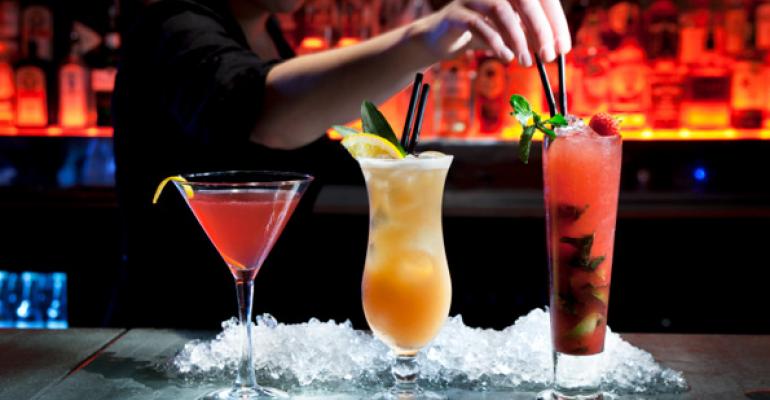
Let’s hope positive news about first quarter 2013 bar and restaurant liquor sales just released by data firm GuestMetrics—more patrons are trading up to premium brands—signals the start of an unshakable trend. Operators need this extra revenue, and patrons may be reluctant to provide it now that a New Jersey investigation has shown that some restaurants routinely substitute cheaper brands of spirits for premium brands and pocket the difference.
The New Jersey Division of Alcoholic Beverage Control’s “Operation Swill” found that 29 establishments, 13 of them TGI Fridays operated by that chain’s largest U.S. franchisee, systematically refilled empty bottles of premium spirits with cheaper brands, then charged customers the premium price.
“This alleged scheme is a dishonest ruse to increase profits, and it is a slap in the face to the consumer,” said New Jersey attorney general Jeffrey Chiesa. “Consumers should have the peace of mind of knowing that they will get what they spent their hard-earned money on every single time—no exceptions.
“I believe Operation Swill will go a long way toward restoring that peace of mind and will also serve as a warning to anyone currently engaging in, or thinking about engaging in, this fraudulent practice,” he added.
It comes as no surprise to many operators that some restaurants pull this stunt. Even though a well-run bar will have a pouring cost of around 18 percent—leaving plenty of room for profit—it’s easy to get greedy and sell cheap liquor as premium.
The risk? Customers might notice, or at least have suspicions, and that’s never good. But getting in legal trouble for serving cut-rate booze seems like a million-to-one shot, especially for a restaurant that engages in the practice intermittently.
If that’s your assumption, be aware that in New Jersey, authorities used a dragnet manned by 100 officials and went high-tech with a British-built device called the True Spirit Authenticator, a portable ultraviolet spectro photo meter that can be used on-site. Authorities collected samples from 63 establishments. Of the 150 samples collected, 30 were flagged as fakes. Inventory records were also seized.
What did these investigators look for? The raid concentrated on these “brands of interest”:
Vodka: Finlandia, Smirnoff, Absolut, Grey Goose, Ketel One
Gin: Tanqueray, Bombay Sapphire, Gordon’s
Rum: Bacardi Light, Bacardi Dark, Captain Morgan Spiced
Scotch: Johnny Walker Black, Dewar’s
Whiskey: Jack Daniel’s Black Label, Jim Beam, Knob Creek, Maker’s Mark
Tequila: Jose Cuervo Silver, Jose Cuervo Gold, Patron Silver

No charges have been filed yet as a result of this investigation. But you can bet the owners of the 29 establishments that were caught are hoping their liquor licenses don’t get suspended or revoked. In the interim, we can only wonder how the bar business is holding up at the 13 TGI Fridays and other restaurants caught in this raid. Who would drink there now?
But at least there’s plenty of premium drink business to go after for restaurants. GuestMetrics first quarter 2013 data shows a continuing “hollowing-out” in the spirits category, with brands on the high and low ends of the pricing spectrum increasing sales while those in the middle shrink.
“Looking at the spirits categories that saw the largest shifts in price segments, bourbons has seen the most dramatic hollowing-out effect. Super premium’s share of bourbon sales increased from 14 percent in 2011 to 15 percent in 2012 and reached 16 percent in 1Q13, while value’s share increased from 9 percent in 2011 to 12 percent in 2012, and is now almost 16 percent in 1Q13,” says Brian Barrett, GuestMetrics president. “Super premium in scotch saw its sales share increase from about 58.5 percent in 2011 to 60.5 percent in 1Q13, and in tequila, increased from about 14 percent of sales in 2011 to about 16 percent in 1Q13. The largest spirits category, vodka, has also seen some premiumization take place, with super premium and high end brands together gaining about 1.5 points of share from 2011 to 1Q13.”
Let’s hope premium brand spirits drinkers shrug off the results of “Operation Swill.” Even the suspicion that a restaurant is doing something similar could have a strong negative influence on its bar business.




